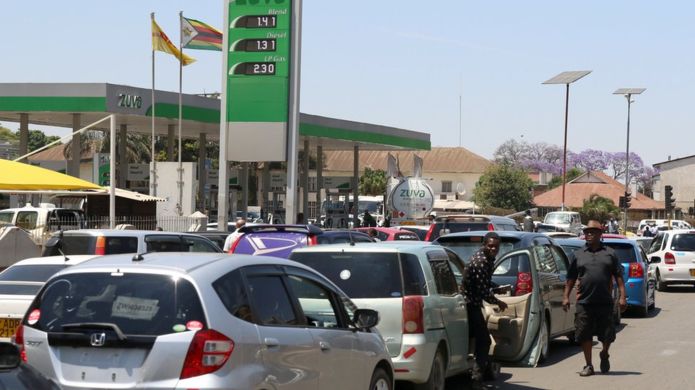Fuel prices go up again

A survey by the Daily News yesterday showed that the price for both petrol and diesel has increased by two cents, with the former fetching $1,43 from $1,41, while the
latter has gone up to $1,35 from $1,33.
Energy and Power Development minister Joram Gumbo, pictured, confirmed the increase, saying it was a result of pricing trends on the global market.
“The price of fuel is reviewed every week by the Zimbabwe Energy Regulatory Authority (Zera), so there was an increase on the international market. The international market is no longer stable; it regularly fluctuates, so Zera will keep on reviewing the fuel prices,” said Gumbo.
“As we speak, it has gone up by two cents for both petrol and diesel. So petrol has gone up from $1,41 to $1,43, that is the price for the week and diesel has gone up to $1,35 from $1,33,” he added.
Zimbabwe has over the last few months been experiencing intermittent fuel supplies, blamed on foreign currency shortages.
As the shortages continue, some motorists are now resorting to the black market, where the commodity is sold at a higher price, with some dealers demanding payment in foreign currency.
The rise in the cost of fuel will obviously have a negative impact on the economy, as it puts pressure on the cost of transporting goods as well as the price of food and services.
President of the Confederation of Zimbabwe Retailers, Denford Mutashu, told the Daily News yesterday that the fuel price increase was likely to impact on the other sectors of the economy.
“Cost drivers like fuel have an implication on general pricing and any price movement has an effect. Retailers are price takers and in most cases will simply pass on the price hike onto the market,” Mutashu said.
Government is on record claiming that there has been an increase in the number of cars in the country, which has also increased the demand for fuel.
According to officials, the country is at the moment consuming four million litres of diesel up from 2,5 million litres a week while three million litres of petrol is being pumped, up from 1, 5 million litres per week.
Owing to the increase in demand for fuel on the market, the Reserve Bank of Zimbabwe (RBZ), which previously allocated $20 million for fuel, has increased the weekly allocation for the procurement of the commodity to $35 million per week.
But there are claims that some pump stations are creating artificial shortages by deliberately withholding the product for speculative reasons.
Last week, Zera, issued a statement, warning fuel dealers against creating artificial shortages by limiting supplies or hoarding for speculative purposes.
Zera said these actions are in violation of the Petroleum (Fuel Pricing) (Amendment) Regulations, 2015 (No.10 published in Statutory Instrument 20 of 2015 which prohibits the withholding of petroleum products for speculative purposes and charging fuel prices that are beyond the prescribed limits.
“Petroleum licencees are hereby warned to cease and desist from such criminal activities as they risk prosecution and cancellation of their licences,” Zera said.
Fuel operators have largely attributed the obtaining intermittent fuel crisis to the shortage of foreign currency, as the country is grappling with serious liquidity constraints.
Retailers buy their products outside the country through the RBZ which pays directly to the suppliers.
In terms of the arrangement that was created by the central bank, oil companies, which are top on the priority list, approach their banks and request that payment of a certain amount be made to a company that they will be dealing with on the basis of their nostro accounts.
Following the request, the bank would accept the request, with approval from RBZ. Daily News.






